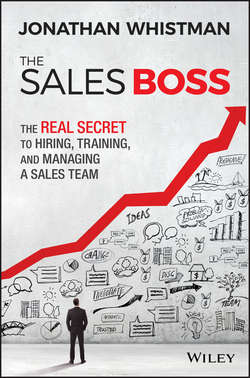Читать книгу The Sales Boss - Whistman Jonathan - Страница 2
На сайте Литреса книга снята с продажи.
Foreword
ОглавлениеI am pleased to be introducing you to the book you hold in your hands, The Sales Boss: The Real Secret to Hiring, Training, and Managing a Sales Team, as I have experienced first-hand the financial results possible when an organization’s sales team is led by a skilled person operating at the highest level of sales management. My hope is that after you read the book you’ll understand all of the nuances involved in leading a high performance sales team and that you’ll agree with the statement Nothing happens until someone sells something. This is a statement I only fully understood after leading and being responsible for creating profit at for-profit organizations and a lesson I believe is critical to pass on to leaders at today’s companies. I’d like to briefly share my journey on the path to understanding the truth behind this statement.
Starting my corporate career as an industrial engineer working on the manufacturing line of a GE plant in Middle America, I could have sworn then that nothing happened if someone didn’t make something. I quickly learned, however, that a person or a business can make anything it wants, at whatever quality level it chooses, and price it however it sees fit. But there is simply no guarantee that it will sell. And if it doesn’t sell, then there is no business.. period.
After a few years of working on the line, I decided to continue my education and was accepted into Harvard Business School’s MBA program. Over the next years, I rubbed shoulders with the global business elite and the who’s who of management academia, including the likes of Michael Porter. The interesting thing was, though, that while we spent a lot of time learning about strategy, leadership, and even marketing, neither sales nor sales management was ever discussed.
It wasn’t until I went back to corporate America as a marketing manager in a medical equipment business that I began to realize that sales was likely the most important function never taught in business school.
In my new role, I noticed a great deal of management time and financial investment being devoted to managing our customers’ increasingly professionalized purchasing function. From better selling techniques that refocused our sales force’s efforts from feature/benefit-based to value-based selling, all the way through significant investments in sales automation technology, the amount of energy and resources being pumped into better selling was hard to miss.
Even so, only a few teams and individuals met their increasingly challenging goals. Even fewer exceeded them. One thing, however, was common among those individuals and teams that were consistent top performers: They were led by a remarkable sales manager. The old adage noting that there are indeed no bad soldiers, only bad officers, began to prove itself over and over, every year that I observed what made top performance in sales happen.
Patterns quickly became obvious in those sales leaders who were consistent in their results. They were individuals who seemed to have a special kind of rapport with their teams and who made no excuses. When I asked their team members what made their managers successful, the answers I received were almost always consistent:
“We know what they expect, and we are happy to consistently hear about it.”
“With [insert manager name here], every week we have to show up and answer the same questions, and our answers better be right.”
“I want to be the best, so I want to work under the best.”
“XYZ is about as maniacal about our rhythm and cadence as he is about being accurate in our forecast.”
There were other answers that I did not expect, however. They were more subtle distinctions in how these managers operated. But, as I quickly learned, those subtleties made a huge difference in results:
“We know our manager has our backs and cares about us.”
“They always take full responsibility for our results. We always want to make them look good, because they make us good.”
“They make me a better person.”
Nothing really magical came up, however. No especially noticeable skill or interpersonal characteristic such as an unusually high level of charisma ever reared its head. This made it clear to me that, much like every other function in business, sales leadership is much less art and much more science. It is a process and, as such, has recognizable variables that, when managed and controlled for appropriately, produce consistent results.
Over the last decade, I’ve spent a large portion of my professional time learning about these variables from more than a dozen experts and consultants. I’ve even been personally trained and certified in well-known selling methodologies, including Miller Heiman’s Strategic Selling and SPIN, to further develop my own selling and sales management skills. It has been time well spent. My companies’ results have always spoken for themselves.
This is how I originally came across Jonathan Whistman and his Sales Boss framework. Based on the results we achieved, Jonathan has trained several of our teams, and his company evaluates all of our employees before they are hired. So I was delighted to read this book, as it provides readers with a framework to recognize all of the key variables that I’ve identified over the years as being “the difference that makes a difference.”
It offers great potential to progressive organizations and individuals who are listeners and learners, not sandbaggers. I have used its concepts at every one of my companies, and they work. Most importantly, however, the framework elegantly highlights the fact that selling is not a stand-alone process. To borrow from Churchill, it only represents the end of the beginning. I encourage you to read with an open mind and be ready for the transformation into a Sales Boss.
Ruben Salinas
President and CEO
Parsagen Diagnostics, Inc.
